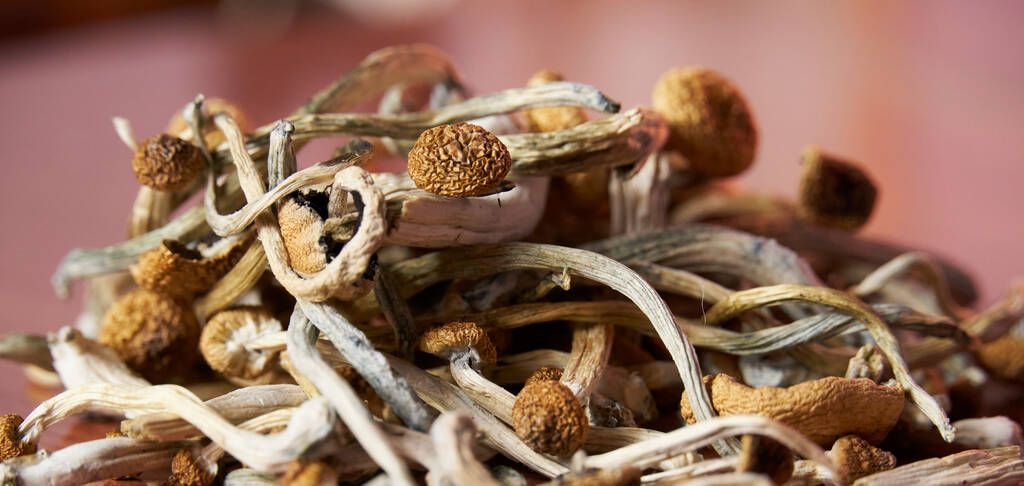A newly systematic review of clinical trials reveals psilocybin-assisted therapy may provide substantial relief for individuals with major depressive disorder, including treatment-resistant cases.

Dried psilocybin mushrooms.
Published in the psychiatry journal Acta Psychiatrica Scandinavica, the study consolidates findings from six randomized controlled trials, involving 427 participants, to evaluate the efficacy and safety of this emerging treatment.
Researchers from India’s National Institute of Mental Health and Neurosciences, Jawaharlal Institute of Postgraduate Medical Education and Research, and Pondicherry Institute of Medical Sciences spearheaded the analysis.
“Our primary efficacy outcome was 1-week (or nearest) between-group change in depression ratings”, states the study. “Secondary efficacy outcomes were changes in depression ratings at days 2, 14, and 42 (or nearest) and study-defined response and remission rates at week 1 (or nearest). Safety outcomes were reported adverse effects.”
Researchers “pooled outcomes in random-effects meta-analyses using standardized mean difference (SMD; Hedges g) for continuous outcomes and risk ratio (RR) for categorical outcomes.”
Researchers found that psilocybin-assisted therapy led to significant improvements in depression symptoms compared to standard treatments, with noticeable effects starting as early as two days after treatment and lasting up to six weeks.
Patients receiving psilocybin were over three times more likely to show a positive response or achieve remission compared to those in control groups. The analysis showed consistent and reliable results across studies, suggesting psilocybin-assisted therapy as an effective option for treating depression.
“Antidepressant effects of psilocybin-assisted therapy are superior (with at least medium effect sizes) to comparator interventions for at least up to 6 weeks postintervention”, concludes the study.
The study’s full abstract can be found below.
Introduction: There is growing interest in the use of psychedelic-assisted therapy (PAT) for major depressive disorder (MDD), including treatment-resistant depression. We used randomized controlled trial (RCT) data to compare summary estimates of change in depression ratings with PAT versus comparator treatments in MDD. We also compared response and remission rates, and adverse effects.
Methods: We searched MEDLINE, EMBASE, Cochrane Central Register for Controlled Trials (CENTRAL), and SCOPUS from inception till April 2024. Our primary efficacy outcome was 1-week (or nearest) between-group change in depression ratings. Secondary efficacy outcomes were changes in depression ratings at days 2, 14, and 42 (or nearest) and study-defined response and remission rates at week 1 (or nearest). Safety outcomes were reported adverse effects. We pooled outcomes in random-effects meta-analyses using standardized mean difference (SMD; Hedges g) for continuous outcomes and risk ratio (RR) for categorical outcomes.
Results: We found 6 eligible RCTs (pooled N = 427), all on psilocybin. The pooled SMD for 1-week between-group change in depression ratings was -0.72 [95% CI, -0.95 to -0.49; I2 = 17%; 5 RCTs; n = 403], favouring PAT; results were similar at days 2, 14, and 42. The response [RR = 3.42; 95% CI, 2.35-4.97; I2 = 0%; 4 RCTs; n = 373] and remission [RR = 3.66; 95% CI, 2.26-5.92; I2 = 0%; 4 RCTs; n = 373] rates also favored PAT. The PAT group had a small but significantly increased risk of developing any adverse event [RR = 1.20; 95% CI, 1.01-1.42; I2 = 43%; 4 RCTs; n = 373] and a significantly higher risk of experiencing headache [RR = 1.78; 95% CI, 1.10-2.86; I2 = 52%; 4 RCTs; n = 373] and dizziness [RR = 6.52; 95% CI, 1.19-35.87; I2 = 0%; 3 RCTs; n = 269]. Low heterogeneity characterized most analyses and findings were similar in sensitivity analyses.
Conclusion: Antidepressant effects of psilocybin-assisted therapy are superior (with at least medium effect sizes) to comparator interventions for at least up to 6 weeks postintervention.







